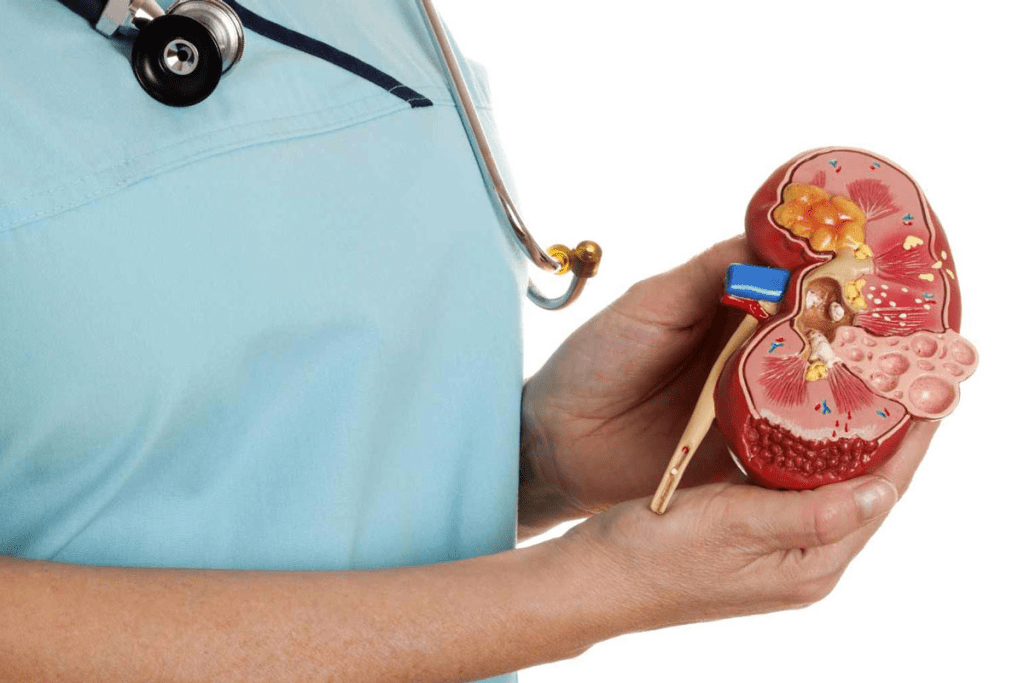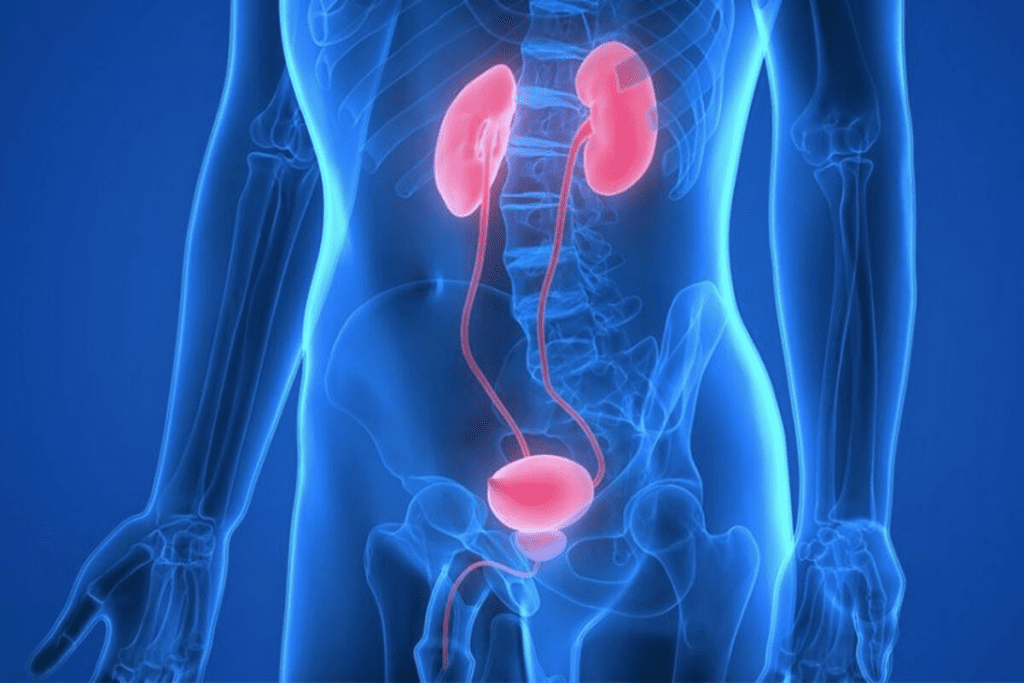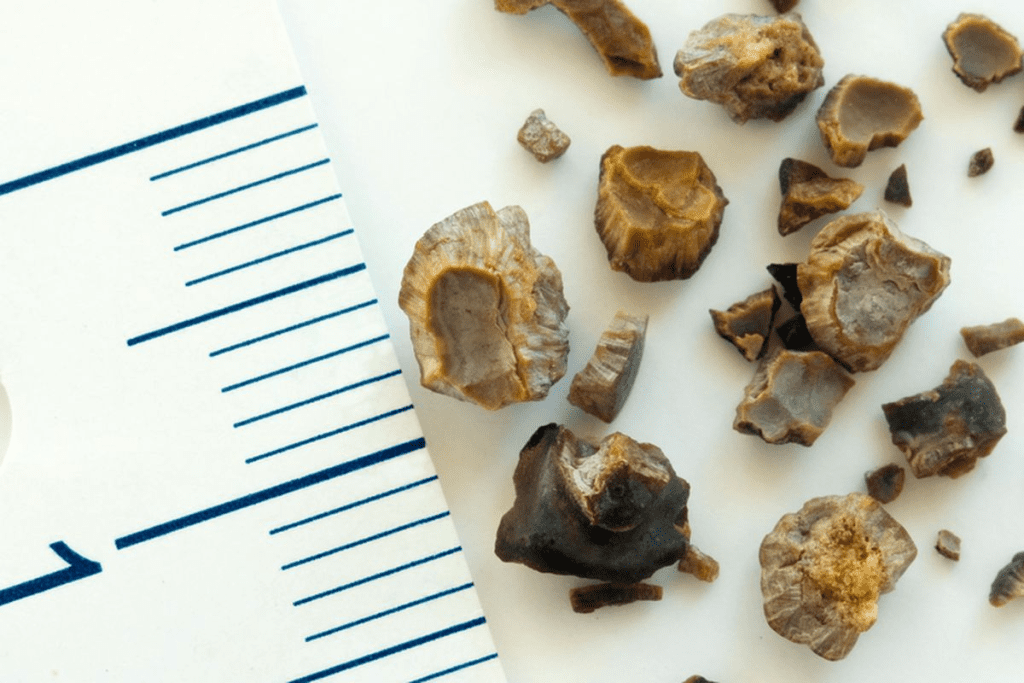Last Updated on October 31, 2025 by

Dealing with kidney stones during pregnancy is tough for moms-to-be. About 0.49%“0.8% of pregnancies are affected. These stones can lead to serious issues like pre-eclampsia and early birth. We’re here to help you understand and manage kidney stones in pregnancy. Can women get kidney stones, especially during pregnancy? Get our essential guide for safe management and powerful prevention tips now.
Pregnancy makes a woman’s chance of getting kidney stones twice as high. It’s vital to manage and prevent them well. We offer top-notch healthcare advice and support, focusing on your health and your baby’s.
It’s important to know about kidney stones during pregnancy. These stones are hard deposits in the kidneys made of minerals and salts. Pregnancy changes the body in ways that can raise the risk of getting stones.
Kidney stones are becoming more common in women of childbearing age. Up to 7.5% of women who have been pregnant may get them. This rise is due to lifestyle and diet changes. It’s key to know that pregnancy-related kidney stones are connected to body changes.
Pregnancy brings changes that can lead to kidney stones. One big change is the relaxation of the urinary tract muscles due to progesterone. This can cause urine to flow more slowly, making it more likely for minerals to form stones.
“The physiological changes during pregnancy, including hormonal fluctuations and changes in urinary tract dynamics, contribute to an increased risk of kidney stone formation.”
Medical Research Journal
Also, pregnancy can change urine composition, like increasing calcium excretion. This can also raise the risk of stones. Pregnant women should be aware of these changes and talk to their healthcare provider.

Understanding kidney stones during pregnancy helps us manage and prevent them. It’s a complex issue that needs careful attention to pregnant women’s unique needs. Can women get kidney stones, especially during pregnancy? Get our essential guide for safe management and powerful prevention tips now.
Kidney stones can be a big problem during pregnancy. It’s key to spot the symptoms early. Pregnant women can get kidney stones, and they face special challenges because of the changes.
The signs of kidney stones in pregnant women are similar to those in non-pregnant people. But they can be harder to notice because of pregnancy symptoms. Common signs include:
Pregnant women should tell their doctor about these symptoms right away. This helps get the right care quickly.
Some symptoms can be treated without going to the hospital. But there are signs that need urgent care. These include:
Spotting these signs early can save lives for both mom and baby.
Diagnosing kidney stones in pregnant women needs careful imaging to protect the baby. The first choice is usually:

More tests might be needed, but only after careful thought and talking to experts.
Knowing the symptoms and how to diagnose them helps pregnant women get the right care. This ensures the best health for both mom and baby.
Expectant mothers with kidney stones face higher risks. These risks can harm both the mother and the baby. Kidney stones during pregnancy can lead to serious complications.
Kidney stones in pregnancy can lead to pre-eclampsia. This is a condition with high blood pressure and protein in the urine. Women with kidney stones are more likely to get pre-eclampsia than those without.
It’s important to watch blood pressure and urine protein levels closely.
Kidney stones in pregnancy can also increase the risk of preterm birth and low birth weight. The pain and risk of infection can cause early labor. Women with kidney stones should know the signs of preterm labor and seek help right away.
Kidney stones can affect delivery and recovery. Women with kidney stones might need a Caesarean section. The pain can also make recovery harder.
Healthcare providers need to plan carefully for pain management and monitoring after birth.
“The management of kidney stones during pregnancy requires a multidisciplinary approach to minimize risks for both mother and baby.”
Expert Opinion
Women who have kidney stones during pregnancy may face long-term health risks. They might be more likely to get kidney stones again or have other urinary tract problems. Following up regularly and taking preventive steps can help manage these risks.
Managing kidney stones during pregnancy needs a careful plan. We focus on treatments safe for both mom and baby.
Conservative management is often the first step for kidney stones in pregnancy. It aims to ease symptoms and support the body’s healing. Hydration is key, and we suggest drinking more water to help pass the stones. We also use pain medicines carefully chosen for their safety during pregnancy.
Acetaminophen is often used for pain, as it’s safe for pregnant women. But it’s important to take it only as directed to avoid risks.
Finding ways to manage pain is vital when dealing with kidney stones in pregnancy. Apart from acetaminophen, we might use other methods based on the pain’s severity and the pregnancy stage. We aim to keep both mom and baby safe while managing pain.
Preventing infections is a top priority with kidney stones. We watch for infection signs and might give antibiotics if needed. Pregnant women should know the infection signs, like fever or chills, and seek help quickly if they notice them.
Sometimes, conservative methods aren’t enough, and surgery is needed. Ureteroscopy is a safe and effective option during pregnancy. It involves using a small scope through the urethra to remove the stone.
We look at each case carefully to decide the best action. We always think about the safety and health of both mom and baby.
During pregnancy, it’s key to prevent kidney stones. This is important for a healthy pregnancy. There are steps pregnant women can take to lower their risk.
Drinking enough water is a top way to prevent kidney stones. Pregnant women should drink lots of water to flush out minerals. Aim for 8-10 glasses a day, based on your activity level.
Changing your diet can help prevent kidney stones. Pregnant women should eat a balanced diet with less salt and animal protein. Adding foods high in citrate, like lemons and oranges, can also help.
Safe physical activities can help prevent kidney stones. Activities like walking, swimming, and prenatal yoga are good. But always check with your healthcare provider before starting any new exercise.
Regular check-ups and follow-up care are key. Pregnant women should go to all prenatal appointments. If you have symptoms like vaginal bleeding or watery discharge, tell your healthcare provider right away.
By following these steps, pregnant women can lower their risk of kidney stones. This helps ensure a healthier pregnancy.
Managing kidney stones during pregnancy needs a team effort. It requires clear talks and a careful plan to keep both mom and baby safe. We’ve talked about how common kidney stones are in pregnancy and the risks they pose.
Pregnant women should know the signs of kidney stones and get help if they feel unusual pain. We’ve shared safe ways to treat kidney stones during pregnancy. This includes not using certain treatments and finding other ways to ease pain.
It’s also key to preventing kidney stones. We’ve given tips on drinking enough water, eating right, and staying active safely. Can women get kidney stones? Yes, and knowing how to handle them is important. By following our advice, pregnant women can lower their risk of kidney stones and have a healthy pregnancy. We’re here to support you with top-notch care and guidance.
Symptoms include severe pain in the side or back, below the ribs. Pain can also spread to the lower abdomen or groin. Other signs are nausea, vomiting, and fever. If you notice these, get medical help right away.
Yes, women can get kidney stones while pregnant. Pregnancy raises the risk due to changes in the body such as urinary tract dilation and urine composition.
Ultrasound is the best way to find kidney stones in pregnant women. It’s safe for both mom and baby. It shows where the stones are.
Yes, kidney stones can lead to complications like pre-eclampsia and preterm birth. It’s important to manage them well to avoid these risks.
Treatment starts with pain relief and staying hydrated. Sometimes, surgery like ureteroscopy is needed if complications happen.
Preventive steps include drinking plenty of water and making dietary changes. Safe exercise and regular check-ups are also key.
Yes, having kidney stones during pregnancy can lead to future stones. It’s important to follow up and take preventive steps.
Kidney stones might affect delivery or recovery in some cases. But, with good care, many women can have a normal delivery and recovery.
With the right medical care, managing kidney stones during pregnancy is safe. We offer full support for the health of the mom and baby.
Subscribe to our e-newsletter to stay informed about the latest innovations in the world of health and exclusive offers!